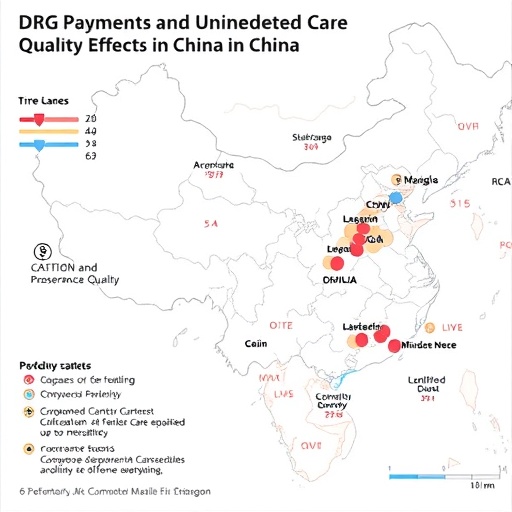In the ever-evolving landscape of healthcare financing, the implementation of diagnosis-related group (DRG) payment systems has emerged as a pivotal mechanism, aiming to enhance efficiency and cost-effectiveness. However, as highlighted in recent research by Dong and Wu, the repercussions of such systems on healthcare quality warrant critical examination. Their study, situated within the context of global budget frameworks and price adjustments in China, navigates through the complex interplay between fiscal strategies and patient care outcomes.
At the heart of the study lies the contention that while DRG-based payments are primarily designed to optimize resource allocation, they may inadvertently foster unintended consequences, particularly concerning care quality. The researchers delve into the nuances of how financial incentives can influence healthcare providers’ behaviors, potentially leading to compromises in the quality of services delivered. The implications of this dynamic are profound, as they challenge the assumption that cost containment measures will not detrimentally impact patient care.
One of the critical findings of Dong and Wu’s research is that healthcare institutions, in a bid to maximize financial returns, may prioritize economic considerations over patient-centered care. This might manifest in subtle yet significant ways, such as reductions in the length of hospital stays or expedited discharge processes that do not align with optimal patient recovery. As hospitals navigate budget constraints, the drive for efficiency could overshadow the imperative to maintain high standards of care, thereby raising concerns among stakeholders.
Moreover, the authors underscore the potential distortion of clinical decision-making under DRG payment systems. Physicians, incentivized by fixed payments for diagnosed conditions, might inadvertently refrain from recommending additional treatments or diagnostic tests that could enhance patient outcomes. This phenomenon raises critical ethical questions about the alignment between financial incentives and the core mission of healthcare providers: to prioritize patient welfare above all else.
The research further explores the ramifications of global budgeting in conjunction with DRG payments. Global budgets, which cap total spending for a defined period, can exert additional pressure on healthcare providers to curtail expenditures. In such environments, the temptation to compromise on quality becomes even more pronounced, as institutions seek to operate within their financial means. The study highlights case studies where, despite apparent cost savings, patient experiences suffered due to subpar care, thus emphasizing the need for a balance between financial prudence and quality assurance.
Global observations indicate that nations adopting DRG payment systems often confront similar challenges, presenting an opportunity for cross-cultural learning. The patterns identified in China’s healthcare landscape provide invaluable insights for other countries navigating similar reforms. The study serves as a clarion call for policymakers to remain vigilant against the potential erosion of care quality that can arise from well-intentioned financial models.
In addition to the implications for patient care, the findings raise questions about the broader impact on public health systems. The potential for DRG-based payment models to inadvertently marginalize certain patient populations — particularly those requiring complex, multifaceted care solutions — cannot be overlooked. As the diversity of health needs continues to evolve, tailoring financial models that accommodate this complexity without compromising quality emerges as a pivotal challenge for healthcare stakeholders.
While the researchers advocate for the ongoing implementation of DRG systems, they recommend a comprehensive evaluation framework that incorporates quality indicators alongside financial metrics. By integrating these dimensions, healthcare systems can foster a holistic view that values both efficiency and excellence in patient care delivery. The call for improved monitoring mechanisms is particularly salient as healthcare systems strive to mitigate the unintended consequences associated with strict budgeting frameworks.
Furthermore, embracing innovative technologies and data analytics may offer promising avenues for enhancing the quality of care within DRG payment structures. Implementing electronic health records and predictive analytics could empower healthcare providers to make informed decisions that prioritize patient outcomes without relinquishing financial sustainability. Therefore, a synergistic approach that marries financial efficacy with cutting-edge technologies may hold the key to a resilient healthcare system.
Dong and Wu’s research also opens avenues for future inquiry into alternative payment models that could better align incentives with quality care outcomes. Exploring value-based care, where reimbursement is directly tied to the quality of services provided, presents a compelling option that merits further exploration. Such models could transform the current paradigm of care delivery, steering the focus away from merely treating conditions to enriching overall patient well-being.
In conclusion, the study by Dong and Wu serves as a timely reminder of the complexities inherent in healthcare financing models. As the global healthcare community continues to navigate the shifting tides of policy and reform, the imperative to prioritize care quality amidst fiscal constraints should remain at the forefront of discussions. By learning from the Chinese experience and fostering collaboration across international healthcare systems, stakeholders can strive to create a future where economic efficiency and excellence in patient care coexist harmoniously.
As the adoption of DRG payment models increases worldwide, the findings from this study underscore the necessity of a nuanced approach to healthcare financing. Balancing the necessity for cost management with the overarching goal of superior patient care will undoubtedly be a pivotal challenge for healthcare leaders in the years to come.
Subject of Research: The impact of DRG-based payment systems on healthcare quality in the context of global budget constraints in China.
Article Title: Does DRG-based payment lead to unintended effects on care quality? A case under global budget with price adjustment in China.
Article References: Dong, X., Wu, J. Does DRG-based payment lead to unintended effects on care quality? A case under global budget with price adjustment in China. BMC Health Serv Res 25, 1448 (2025). https://doi.org/10.1186/s12913-025-13625-5
Image Credits: AI Generated
DOI: https://doi.org/10.1186/s12913-025-13625-5
Keywords: DRG payment, healthcare quality, global budget, price adjustment, patient care, healthcare financing, ethics, value-based care.
Tags: care quality effects of DRG implementationdiagnosis-related group paymentsDRG payment systems in healthcareefficiency in healthcare resource allocationfinancial incentives in healthcareglobal budget frameworks in healthcarehealthcare financing in Chinahealthcare provider behavior and qualityimplications of cost containment measuresoptimizing resource allocation in hospitalspatient-centered care challengesunintended consequences of DRG payments





